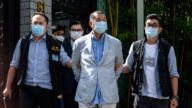【新唐人2013年01月17日訊】繼續關心大陸的空氣污染問題。北京市環保監測中心早前預計,16號白天,北京市地面處於冷高壓前部,會出現三四級偏北風,污染擴散條件較好,預計,大部分地方空氣質量會是「良」,部分區域會出現「優」。但實際情況如何﹖讓本臺記者告訴你!
北京市民王女士向《新唐人》表示,16號,雖然北京出了太陽,但沒有甚麼風,天空仍然霧濛濛!
北京市民王女士:「今天的天氣稍為好轉了,前兩天大霧,特別嚴重,今天好了,今天有太陽了,(可是)按說這麼好的太陽應該是清晰的一種感覺,現在還是霧濛濛的,(能見度)也就一、二百米吧!」
中國問題學家鞏勝利 表示,這場60幾年未遇的霧霾天氣,因為15號下雪,雪雨過濾了霧霾,如未下雪,這種狀況還可能延續下去。
中國問題學家鞏勝利:「中國因為它(中共)前面30年的改革開放,經濟的環境,就是從發展當中——工廠、企業排放的自然的廢物,對環境的污染。比如,對石油的開採,還有對礦場資源的開採,還有對黃金甚麼的開採,比如紫金礦業——黃金開採,也造成過一些災難。」
德國發行量最大的《圖片報》,以「霧霾!中國是否會窒息於自己的(經濟)成果?」為題報導說,空氣污染的根源,在於中共至今只著眼經濟、不顧環境保護的發展戰略。報導強調,霧霾是中國快速成為世界經濟一強的反面。大陸每天都有新工廠問世,而它們又消耗更多能源。在中國,每星期有一個新的煤電廠投產。
鞏勝利:「中國北方出現霾的天氣,中國南方也很可怕,就是空氣當中酸的含量過大。比如落到樹上,樹葉都要枯萎,酸雨在中國南方廣東是最嚴峻的,這個長期出現人就不適宜居住了。如果(環境)破壞了,可能造成十年、二十年的災難,可能一百年恢復都比較難。」
鞏勝利認為,中國不僅自然環境遭到中共執政後嚴重的破壞,連中國的人文環境也遭到史無前例的破壞。
而中共國務院副總理李克強,15號上午出席會議時,談到空氣污染的治理問題。他說,必須有所作為!
中國政治和社會觀察家戴晴:「就說北京的水短缺,你關幾個高爾夫球場,關他20個,把那個土地關了種樹,你能不能做到,就是那些非富即貴的人沒有人惹得起,我覺得如果一個總理,連這樣的權威都沒有了,那你怎麼治理這個國家﹖」
大陸最新一期的《中國經濟週刊》報導說,國內「飲用水水源合格率不足50%」。有從事水處理30多年,曾任中國疾病預防控制中心的專家表示,中國的「清水」越來越稀缺。北方水量不足,地下水被過度開採,出現硝酸鹽超標,容易誘發血斑病。而在南方,湖泊河流被圈為水產養殖場,飼料中含有的大量蛋白質長期積纍,導致氮磷超標常見。
戴晴:「不可能再發展了——不可持續發展,就是根本你把煤也採光了,你把樹也筏光了,北邊的就是水短缺,南方就是水污染,根本沒有辦法再支持,已經沒有給全世界做低成本勞動力工廠的資格,因為你的環境和資源全部破壞了,這我已經說了20年了,這個觀點說了20年了,沒有人聽……」
在中國中部和東部的霧霾開始消散的同時,上海空氣污染指數16號卻突然飆高,上海環保局發佈的空氣質量指數(AQI)顯示,到上午11點,AQI指數已達216的重度污染級別,首要污染物PM2.5的指數高達每立方米248.6微克。
大陸民間水問題專家張峻峰表示,大陸官員對生態破壞後果認識得很膚淺,他們只是在和大環境做一場博弈。
採訪/易如 編輯/周平 後製/黎安安
China’s Air Pollution: A Result of Regime’s
Wrestling with Nature
Following-up reports on China’s air pollution.
Beijing’s Environment Monitoring Center predicted that
on January 16, a cold front will help disperse air pollutants.
Most city areas will have “good" air quality, and
in some areas, it even can be classified as “excellent".
So what happened in reality? Let’s look at our report.
Beijing resident, Ms. Wang, says that on 16th January,
there was sun and no wind. But the sky was still hazy!
Ms. Wang (Beijing resident):
“Today the weather is getting slightly better.
In the last few days, smog was particularly severe.
Today is sunny. Ordinarily,
we should have a clear line of sight.
But it’s still foggy now, visibility is only within 200 meters!"
Gong Shengli, an expert on China issues, remarks that
this is the thickest smog over the past 60 years.
Snowing on 15th January helped filter out air pollutants,
he says, otherwise, the situation would continue.
Gong Shengli (Expert on China issues):"The growth in China’s
previous 30 years was based on industrial pollution emissions.
Such as exploitation of oil and minerals,
including gold mining.
This had caused large-scale environment pollution in the past."
German newspaper The Bild published a report, titled,
“Smog-Alarm in Peking, China suffocated in its success?"
The article states, China wants to grow, grow, grow.
Environmental protection over there is deemed as a barrier.
The smog is the flip side of China’s rapid rise to
a global economic power.
Each day new factories are opening that consume more energy.
Every week in China someone opens a new coal plant.
Gong Shengli:"North China experienced hazy weather,
while south China suffers from acidic pollutants.
It may cause trees leaves to wither away.
Guangdong suffers from the most severe acid rain.
The long-term effect of acid rain would make it
an unsuitable living place.
The resulted environmental damage may lead to disasters
that could not be restored even in 100 years."
Gong Shengli adds that the damage caused by
the Chinese Communist Party(CCP) rule is not limited to the natural environment.
China’s social and cultural environment was not immune, too.
CCP Vice Premier Li Keqiang attended a meeting on Jan.15.
He claimed to take actions on air pollution control.
Dai Qing (Political & social observers):
“Such as Beijing’s water shortage. Can you shut down 20 golf courses to plant trees on that land?
In reality, no one dares to offend those wealthy and
privileged.
I think if a premier has no such authority to do it,
how can you govern the country?!"
The latest issue of China Economic Weekly reported that
less than 50% of domestic drinking water meets the standard.
A former expert at Chinese Center for Disease Control &
Prevention, with over 30 years water treatment experience,
said that China’s fresh water has become more scarce.
Water shortage and groundwater over-exploitation
affects the north.
Water pollution has resulted in excessive nitrates in waters.
In the south, lakes and rivers are enclosed to be used as
aquaculture farms.
It’s common that the fodder contains excess levels of
nitrogen and phosphorus.
Dai Qing:"It’s impossible to develop further,
it’s unsustainable, when China’s coal reserves are exhausted and all trees cut down.
In the north are water shortages,
while in the south is water pollution.
There’s no way to sustain the growth, which has lost
conditions to be the low-cost labor factories in the world.
The country’s natural resources have all been destroyed.
I hold this view and have called for it for 20 years,
but no one would listen to it …"
When hazy weather in China’s central and
eastern areas began to disperse,
Shanghai’s air quality index (AQI) suddenly
soared on Jan. 16.
The official data showed that on 11 a.m.,
the AQI level has reached 216, severely polluted.
The PM2.5 level exceeded 248 micrograms per cubic meter.
Zhang Junfeng, China’s civil water expert, comments.
Officials in China have only very superficial understanding
of environmental damage and consequences. They are just wrestling with nature.






























